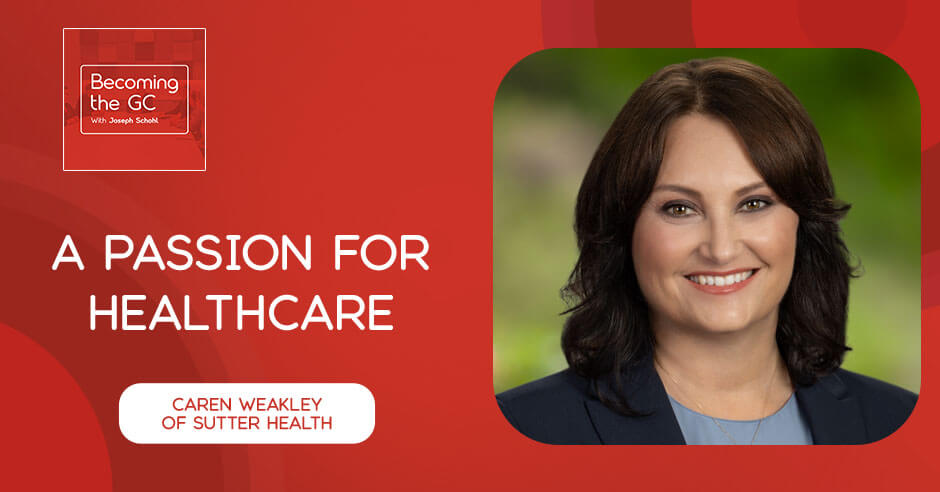
Driven by a passion for healthcare, Caren Weakley, General Counsel of Sutter Health, shares her inspiring journey from law school to leading a major healthcare legal team. Discover how she prioritizes leadership over just legal expertise, building high-performing teams, fostering genuine relationships, and driving success. Caren highlights her career evolution, from navigating the challenges of balancing motherhood and a demanding legal career to embracing the organizational aspects of law and the importance of mentorship. Throughout, Caren’s commitment to her team and her belief in the power of genuine connection shine through, offering valuable insights for aspiring and current leaders in any field.
—
Listen to the podcast here
A Passion For Healthcare: Caren Weakley Of Sutter Health
In this episode, we had Caren Weakley on the show. Caren is a world-class healthcare general counsel and a world-class human being. Stay with me to the end, where I’ll share my key takeaways from the episode. This show is sponsored by Inside Counsel Academy, where in-house counsel go to elevate their careers while enhancing their lives, and also by GeneralCounselWest, a law firm that supports GCs of healthcare companies and their teams with an inside counsel mindset. Without further ado, I bring you Caren Weakley.
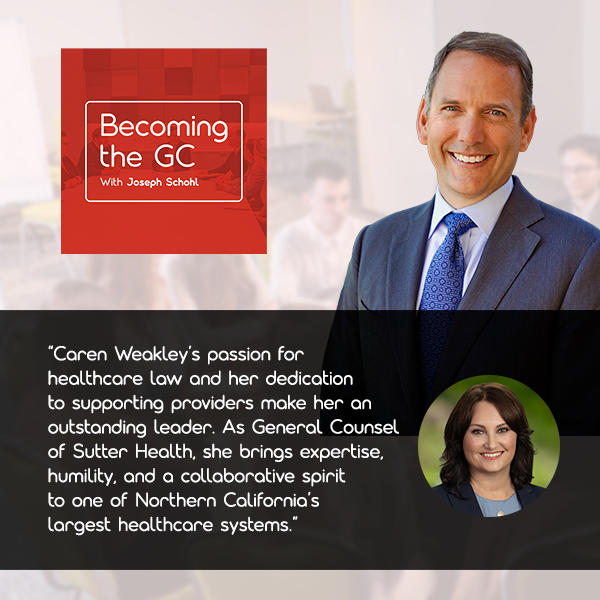
Our guest is Caren Weakley. Caren is the General Counsel of Sutter Health, a not-for-profit integrated health delivery system headquartered in Sacramento, California. Sutter operates 24 acute care hospitals and over 200 clinics in Northern California and employs over 50,000 people. Caren and I have worked together in one capacity or another for over twenty years, and I’m thrilled to welcome her to the show. Hi, Caren.
Joe, great to see you.
How are you?
I’m great.
Fifty thousand is a lot of people.
A lot of new faces to meet. I’ve been at Sutter for a while.
Caren Weakley’s Inspiring Journey Into Law
That’s great. Let’s start at the beginning, and we’ll work back to where you are working forward. What inspired you to pursue a career in law? Did you always aspire to be a general counsel?
Law came probably second to my desire to be in healthcare. My dad is a physician. I was always one of those people who never could decide if I was going to go to medical school or law school. After lots of conversations with my dad, I decided that law was much more fitting to my personality but I had a huge passion for medicine, healthcare, and representing providers. I knew that I wanted to be close to that. I went to law school specifically to be a healthcare lawyer and represent doctors, healthcare providers, and systems. That was my first job coming out of law school in a firm that did that.
I loved it every step of the way. I will be honest. When I was in law school, I didn’t know what a general counsel was. I didn’t ever set a goal to be a GC. I was never title-driven. I only thought maybe I’d be a law firm partner one day. As I progressed in my legal career, I figured out what corporate opportunities there were but I was passionate about the work and somehow titles came along the way. I didn’t ever say, “I’m doing this because I want to be a GC,” although I love it. I feel like I round up where I’m meant to be.
What caused you to make the switch from the law firm to your first in-house role?
At the time, I had two young children. I was in a litigation firm and was trying to balance, like a lot of young parents, being a mother and a lawyer. I happened to know somebody who was in-house at the first big company I went to. He loved it and recommended me. I interviewed and thought, “I’m going to give this a shot.” I didn’t have any idea of what I was getting into. I joined as a part-time independent contractor on a mommy track. Within a year, they asked me to come in full-time and create and build a litigation department from scratch. I fell in love with the organizational aspect of in-house law.
How did you know how to do that?
I didn’t.
How did you figure out how to do that?
Part of being successful for any person is to be humble enough to know when you don’t know the answer, be well-networked and resourceful, and not be afraid to ask stupid questions. People who know me know that I’m not afraid to say what I don’t know. I will ask, “This is going to be a dumb question but I’m going to ask it.”
Part of success is being humble enough to say, 'I don't know,' staying well-networked, being resourceful, and not fearing 'stupid' questions. Share on XThrough the course of my career, I have learned so much by not being afraid to ask and then also not expecting perfection. Sometimes, you don’t let perfect get in the way of good. We want the best outcomes for our company and client and we strive for that but you have to build it often while you’re flying the plane. Know that you’re going to make course corrections along the way and be comfortable with that.
What were some of the pivotal moments or decisions that shaped your path as you went along?
I figured out that being a general counsel was as much, if not more, about leadership and building a team as it is about being a good lawyer. You have to be both but the organizational aspect of being a leader or a GC in a corporation is hugely important. You’re only as good as your team. I fell in love with that part of it. I even went to school to become a certified executive coach. Like you, I loved it. I went to school and got that certification. I did that as a consultant for a while. I use those skills in my in-house practice.
The second thing would be that I stepped out of the legal department for a while. I became the head of all clinical enterprise operations for a large healthcare company. I learned to see the delivery of legal services as a client. When I went back to the law department as general counsel of operations, I tried to bring that perspective to the lawyers on my team.
I would say the last thing is to never underestimate the value of mentors. You have been that for me. Along the way, you meet so many people who are willing to advocate for you, let you step out of your box, try new things, stretch opportunities, and will continue to advocate for you. When you build those friendships and authentic relationships through your career, they’re life-changing. You have those people to go to for advice and who will open doors for you in ways you never imagined.
The Impact Of Mentorship In Shaping Success
Thank you. When I hear you say that, I think about how many people I know who would be speaking about you that way as their mentor and the things that you’ve done for them. Tell me about how that’s shaped your success.
That’s what drives my fulfillment. I could not get up in the morning and do my job. To me, if it wasn’t about relationships and people, helping, and mentoring, my hugest fulfillment is the authentic relationships I have with people I work with who work for me and who I work for. That has fueled me and made me want to work harder, better, and more deliberately because I know the people I’m impacting.
When I think about people and what sets people apart, those who become GCs and those who don’t quite make it, I think about people like you and your ability to build teams. Tell me more about that.
Thank you. To me, the most important thing you can do as a leader or a general counsel is recruit talent, build a great team, and focus on supporting that team. Nurture that team, both individually but as a team culture with team commitments, identity, and values. Your team has to know that you’ve got their back always and who you are authentically. You have to be transparent and vulnerable. They have to trust you more than anything else. High-functioning teams lead to the highest caliber of work. We’ve heard many times in our careers, Joe, as you and I have worked through the organization, that culture drives results. I’m a huge believer in that. My team is everything to me.
Your team needs to know you have their back. They must see your authentic self, with transparency and vulnerability. Share on XHow did that develop for you? You’ll have some people say, “Until I become the GC, I don’t have that opportunity.”
I have always trusted my gut when it has come to hiring people. I hire for culture. You have to have base-level skills and hire qualified people but there are a million qualified lawyers out there. When I meet somebody through a work opportunity or interview, I can sense right away the culture fit of that person. Do they have the right work ethic? Will they bring the right energy? Do we share our mission and values? Will they speak up and share ideas? Will they tell me what they think authentically? Do they seek to be part of a team or are they looking for individual recognition?
It’s certain qualities that I know are imperative to a healthy team. I look for that and then I try to nurture those relationships. Some of the people who I recruited very early in my career when I was far from being a GC, as I got promoted, they got promoted. Their careers followed mine and they’re general counsels of their own or in very senior positions and organizations. I’m so proud of them.
It sounds like you were taking culture seriously way back before you were the GC when you were building your first team, however small. It’s your first higher.
That’s right. I started with very small teams. When I joined my first in-house organization, I oversaw a few people. Even at that point, it was about, “Who can I bring to help me? Who do I seem to click with who will help me build what I want to build,” even though at that time, I was building something much less significant.
How To Nurture Connections In The GC Role
In the general counsel role, you’ve got your internal team but you’ve also got your external relationships as well. Tell me about how you’ve nurtured those relationships.
I’m a general counsel who believes that outside counsel is every bit as much of the team as the internal team. I try to pick external counsel who also shares a good culture fit, who’s seamlessly in bed with the team, and who when you’re on a call with them, you can’t tell who’s the in-house counsel or the outside counsel. When you build those relationships long-term, you find outside counsel who are also incredibly loyal.
They’re willing to go that extra mile and find that extra resource for you. They’re more responsible with their billing and project management. You drive so much ROI for the organization. I want to enjoy the people I’m working with. I want to be able to laugh with my outside counsel and talk about the challenges that we’re facing and how we are going to solve this for the business and partner with the business. I get a lot of enjoyment from that. Similarly, I have found people along the way and I have outside counsel relationships that have lasted for 25 to 30 years.
Growth And Development: Evolving With Senior Leadership Roles
It’s from company to company. Let’s talk about growth opportunities that you’ve had along the way. I like to reference the phrase or there’s a book by the same title, What Got You Here Won’t Get You There. As you’ve moved into more senior roles. What are the things that you’ve had to develop along the way?
I know that very early on, and you gave me this feedback very early on, I was much more risk-averse. I looked at things much more black and white. “It’s a good idea or a bad idea. This will be okay or this will create issues.” I learned along the way to be much more comfortable in the gray. There is a completely acceptable level of business risk. The business team looks at risk much differently than the lawyers look at risk.
That was a skillset I developed when I stepped into operations early on being in a meeting with a bunch of operators. I had joined the team as an operator. I was still thinking like a lawyer. Somebody asked a question and I responded. I thought it was a great idea. Everyone looked around the room. A few minutes later, somebody said the same thing but they rephrased it. Everybody jumped right in.
I thought, “Didn’t I say that?” I remember that I posed it first as, “Here are the things we should worry about but if we solve those things, we can do this.” Whereas the business person said, “Here’s the opportunity. We know we’re going to have to deal with X, Y, or Z but here’s the value in the ROI that we’re going to bring.”
Business folks lead with opportunity and value. They assume we’re going to solve the risks. Unless something is so material, then they won’t go forward. I had to learn to rephrase and reframe how I thought about things so that I could partner with the business. As the general counsel and in-house counsel, it’s your job to issue spot and point out risks but with an eye toward the solution, not with an eye toward shutting down an idea.
A General Counsel’s job is to spot issues and point out risks, but always with an eye toward solutions—not shutting down ideas. Share on XHow do you think about it with vis a vis the rest of your team in that regard? How do you make sure you’ve got the right alignment with how the folks on your team are operating and how you operate? Do you want it to be the same or is it appropriate for it to be different?
On the one hand, I want to mentor and train every lawyer to sit shoulder to shoulder with a business partner, understand their strategy and objectives, help them get there, point out the risks, and find solutions. Let’s be honest. For way more junior lawyers, you don’t want them just problem-solving the risks with their business person and not running that up the flagpole. You need a certain level of training before you’re sophisticated enough to solve that on your own.
There’s always that mentoring, understanding where people are in their journey and then making sure that you or their leader on their aspect of the team is available for mentoring and training. People aren’t afraid to come and say, “I have this business issue that this person wants to drive and I’m nervous about this. What do you do?” You teach them how to problem solve for that.
It’s appropriate for them to be more risk averse when they’re earlier in their career but also make sure they have a dialogue with the folks up the chain with them in the legal team so that they’re bringing those issues and having a discussion, not just telling their client no or yes. That’s how you grow and develop as a junior lawyer with those conversations. Within the legal department, it’s like, “Here’s the situation I’m facing.” With a more senior person, it’s like, “What would you do? What have you seen?”
Create opportunities in the legal department through team meetings and one-on-ones where those issues can be surfaced. Somebody feels comfortable saying, “I’m dealing with this or that.” Either the group helping to support in a pine or their leader helping to support in a pine. The other beneficial thing, and I know you do this and I do this, is skip-level meetings. We’re giving that more junior lawyer the opportunity to meet with folks at different levels and see how people at different levels of a law department address different kinds of situations.
Key Skills Learned On The Journey To Becoming A GC
Caren, as you grew into the GC position, what did you have to learn to do that you hadn’t had to do previously?
It was the extent of board governance and being the chief advisor to a board, even though in prior roles, I had a lot of board experience. For example, I had reported to the chair of the audit committee of a publicly traded board when I ran internal on it. When you’re the GC, you are the chief advisor to the board. That is a role that carries a lot of responsibility and it differs from a public board, a private equity board, and a nonprofit board. It’s all slightly different in its governance and disclosure obligations and the regulations in its obligations and structure. That, to me, was probably the new challenge, stepping into a GC role and having that most senior advisor role on a board.
It makes sense. Often, by the time somebody becomes the GC, they’ve had board exposure and the board has seen them but they’re not seeing them as their lawyer like they are when it’s the GC. It’s at a whole new level of responsibility. I often say that being the GC is one of the loneliest jobs. What do you do to deal with that? Do you belong to any associations or anything where you have peers that you share experiences and draw upon?
There’s a form of healthcare general counsel. We get together and talk about things and share ideas about new regulations and things that are happening in the industry. We have to keep everything very confidential. We’re very mindful of antitrust and all of that but we at least can share best practices organizationally and industry-wide. I go to conferences. I attend Concero and lots of different leadership institute things but it’s my own personal network.
It’s being able to pick up the phone and call the people I trust. I learned early on, and I talk about this with people I coach, that every person in their life has their personal board. Everybody has people around them who are their go-to people for different aspects of their life, career, personal, finance, religion, or whatever it might be. You have to know who’s on your board and who you can pick up the phone and call for different aspects of things that you’re dealing with, career or otherwise. That keeps it not so lonely.
Mentoring The Next Generation: Key Advice For Aspiring GCs
It’s so true. Everybody should have that. You’re one of those people who cultivate those relationships so it’s not just calling when you need something but you’ve got them and you’re supporting those people along the way as well, which is great. Let’s look back at the next generation. When you think about somebody who’s aspiring to be a GC and they were asking you to mentor them, what would you tell them to focus on?
Focus on your leadership ability, do some introspection about how you lead a team, figure out what your vision of a legal department and a GC role looks like, try to make it your own, and be authentic about what you think is most important. Don’t do it for the title. Do it because you want the challenge and you think you’re going to enjoy it every day. There are lots of things we can do in law. If you want that responsibility, take it but don’t do it for the title.
During the course of your career, before you become a GC, take as many different roles. Expose yourself to as many different things within the legal framework and even in the business. Don’t be afraid to step outside your comfort zone. Every one of those experiences will teach you something. Rarely do you look back on your career and say, “I wish I hadn’t had that experience.” Every experience teaches you something.
Every experience teaches you something. Rarely do we look back on our careers and think, 'I wish I hadn’t had that experience.' Share on XThat’s exactly right. Sometimes, people can get overwhelmed with problems. It’s a mindset shift to think of those as, “Why am I going through this? What am I learning from it? How’s that going to be more valuable to me in the future? How’s it going to make me more valuable?”
You probably remember a big matter and investigation where we all have those war stories in our careers. We all have those big investigations, big pieces of litigation, or big transactions. At the time, you’re working all night and working day after day around the clock, sometimes months at a time. You’re exhausted. You’re thinking, “Why did I sign up for this?” You look back and realize how much you learned from those experiences and how much you were able to do. Other people see how much you were able to accomplish. They’re willing to give you more responsibility and accountability. You build relationships by being in the thick of it with other folks and those experiences change your career.
When I think about the definition of authentic and authentic relationships, you come to mind in what you do with your people, what is it about you or what you do to build those?
I don’t know. I just have a genuine interest in people. I don’t think that’s unique to me. I truly care about those folks around me and on my team but that’s not unique. You’re like that. I feel so much accountability and responsibility for the people I lead. The CEO of one of the companies we were at once said, “Leadership is in the eyes of the lead.” That stuck with me. It doesn’t matter what of me as a leader. It matters what the team thinks of me as a leader.
What matters isn't how you see yourself as a leader, but how your team sees you. Share on XI wake up every morning feeling a tremendous amount of responsibility, gratitude, and debt to those who are on the team. I want to make them happy. Making them happy doesn’t always mean they get everything they want. Making them happy means I create the best legal team and the best environment. Sometimes, you have to say no to things that people think are a good idea with the general counsel. That’s not the direction to go. You have to trust your gut.
We were both raised in a company that had fulfillment as one of its core values. We both personally have that as a core value in work. That helps shape things because you’re looking to get fulfillment and lead people toward fulfillment. That’s a different approach than some people take to the workplace and management.
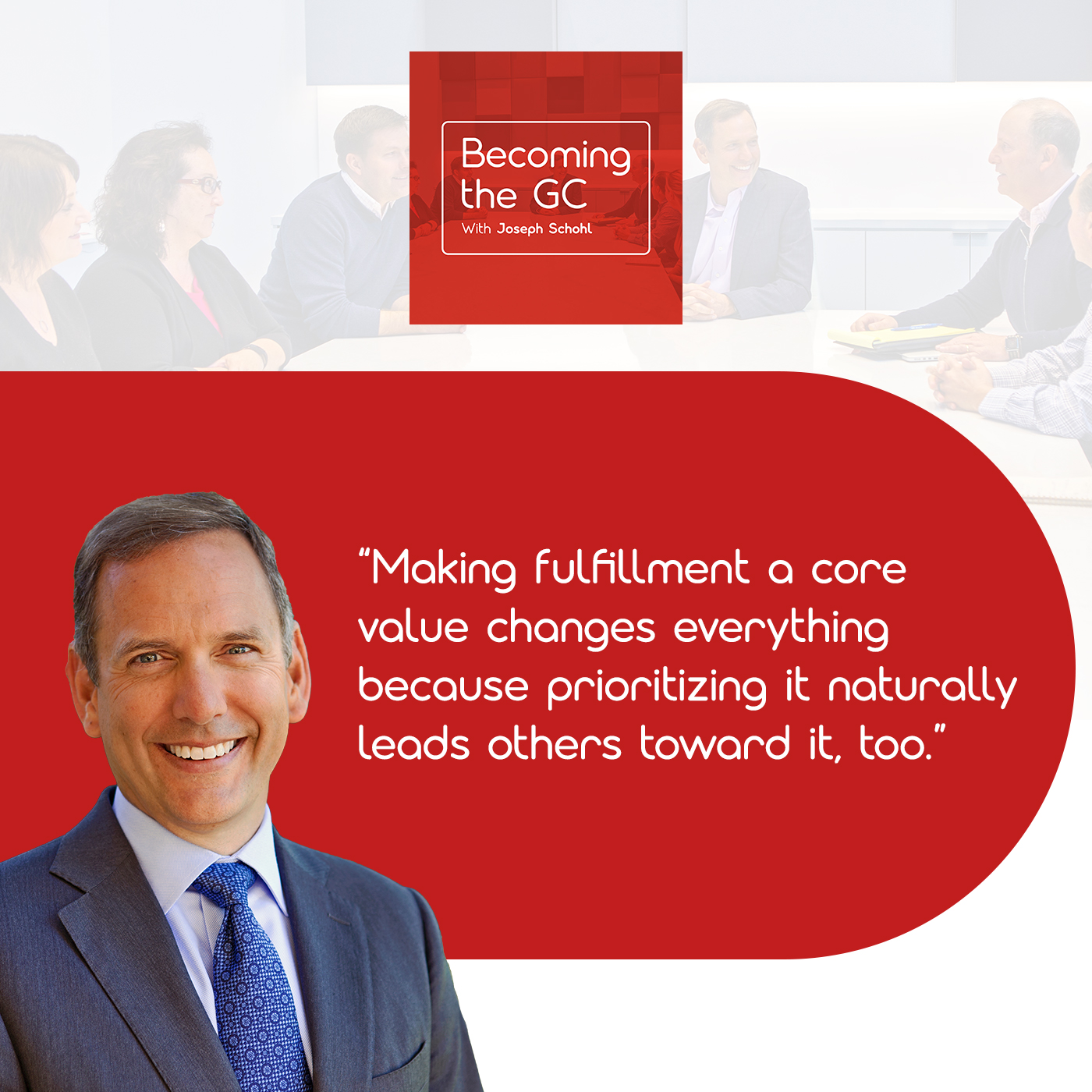
Being any kind of lawyer is incredibly demanding. It’s a lot of hours, hard work, and responsibility. People need an outlet and feel like someone’s got their back. They want to feel part of a family while they’re doing it. We have to create that environment for them.
Looking Ahead: Caren Weakley’s Vision For The Future
We’ve spent a lot of time looking back. I want to ask you, what are you looking forward to?
On the professional side, I’ve been at Sutter for a while. I am looking forward to more years when I can look back and say, “I’ve been here for a few years,” and look at all that we’ve accomplished. We put into place all these things. I’ve finished building this team culture that I’m working through. The team is great and has a tremendous culture. There’s always an opportunity to build on it.
I can’t wait to look back and say, “Look how much further along we are.” On the personal side, my kids are launched so I’m looking forward to this next stage of my life with them and being able to spend time with them differently now that I’m in a position to travel with them and someday have grandchildren and enjoy that part of my life also.
Advice To Younger Self: Key Lessons For Personal And Professional Growth
You have two wonderful, amazing kids. That’s for sure. You’re probably giving them advice all the time so let me ask you this. If you could give one piece of advice to your younger self, what would it be?
You can have it all. Sometimes, you can’t have it all at the same time. You have to always remember alignment. It’s different than balance. It’s knowing what your priorities are at the time. Be true to your priorities. Know at what point you have to double down on family and at what point you have to double down on career. Maybe there are sick parents or other obligations you have in your life. It’s okay to focus on something more than something else.
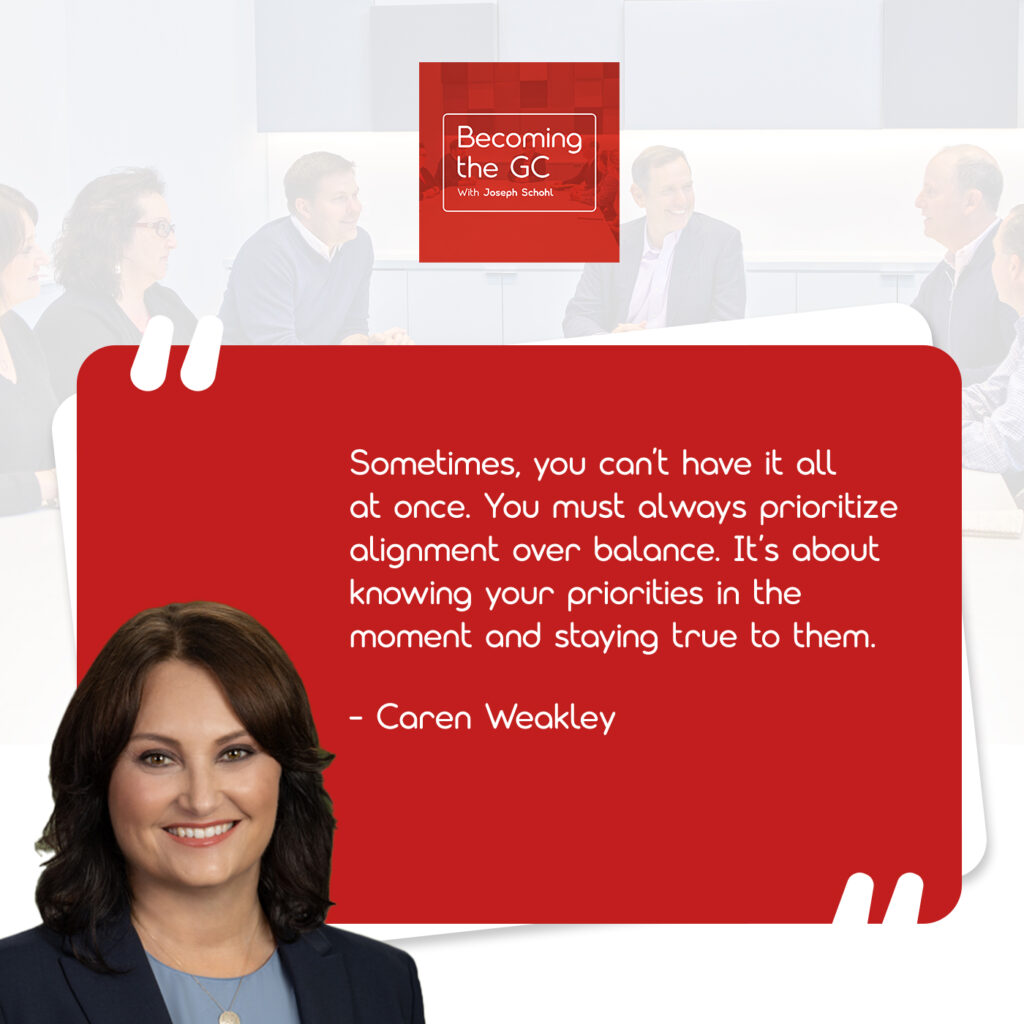
This idea of balance creates a false paradigm for people. You’re inevitably failing because there’s never going to be a day when there’s perfect equilibrium and harmony in everything in your life. Don’t be afraid to take stock and know that sometimes you have to tell work, “I got to step back for a minute,” or family, “I’m going to be tied up for a little bit.” That’s okay. Give yourself permission to be true to your own alignment.
That’s great advice. Congratulations on all your success in your first year. It’s wonderful to see how you’re thriving. It’s a big-scale organization getting the benefit of all your wisdom and a wonderful lawyer but an even more wonderful person. Thank you for being on the show. We’ll have you back anytime.
Thank you for everything along the way, Joe, truly.
Thanks, Caren.
‐‐‐
Thank you for reading. I hope you enjoyed our time with Caren. I know I did. A few key things I’ll take from this episode include 1) How important the team is to Caren. Not only building a team but also supporting and nurturing that team, both the individuals on the team and the team as a team. Even though Caren reported to me in my first GC job, I learned more from her about how to manage a team in a law department. I experienced firsthand what an advocate she is for her people.
Number 2) Caren is extremely self-aware. Her ability to learn from each experience and be a little better every day is what has propelled her career to the top. 3) Caren has a genuine curiosity and interest in the work and the people. Her curiosity and willingness to keep asking questions until she fully understands an issue is a superpower of hers. Until next time. For more tips on accelerating your path to becoming a world-class general counsel, visit InsideCounselAcademy.com and connect with me directly on LinkedIn.
Important Links
- Inside Counsel Academy
- GeneralCounselWest
- Sutter Health
- What Got You Here Won’t Get You There
- Joseph Schohl on LinkedIn
About Caren Weakley
 As General Counsel and a member of Sutter’s Executive Team, Caren Weakley serves as senior legal advisor where she oversees all legal functions and sets the strategy for all litigation and investigations involving Sutter and its legal entities. She provides executive oversight for Sutter Health’s Risk Management functions, as well as for the implementation and administration of Sutter’s Ethics and Compliance Program.
As General Counsel and a member of Sutter’s Executive Team, Caren Weakley serves as senior legal advisor where she oversees all legal functions and sets the strategy for all litigation and investigations involving Sutter and its legal entities. She provides executive oversight for Sutter Health’s Risk Management functions, as well as for the implementation and administration of Sutter’s Ethics and Compliance Program.
Previously, Weakley served as senior vice president and general counsel for Radiology Partners, the leading radiology organization in the United States with approximately 3,600 radiologists serving across 3,200 sites in health systems, hospitals, clinics, and imaging centers. Prior to joining Radiology Partners, Weakley held progressively senior roles at DaVita Kidney Care, including serving as General Counsel, Operations, where she was responsible for providing legal support and guidance to the business operations of DaVita’s 2,700 outpatient dialysis centers.
Weakley earned her undergraduate degree from UCLA and holds a J.D. from Loyola Law School, Los Angeles. She is a certified leadership coach.
